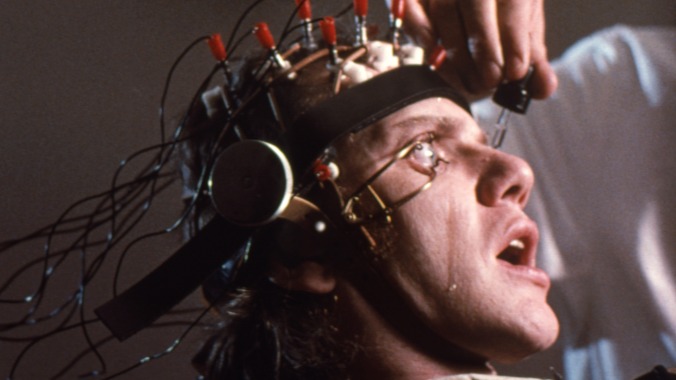Hell yeah those eyelid clamps hurt, confirms A Clockwork Orange's Malcolm McDowell

A Clockwork Orange is a true horrorshow, a cinematic nightmare confronting violence both physical and psychological. Today, in a new Guardian essay, actor Malcolm McDowell reflects on just how much it hurt.
McDowell, who starred alongside his codpiece as lead droog Alex, would know. Sure, he’s often the one dishing it out—to the homeless, to women, to his friends—but, after suffering through the Ludovico Technique, he can do little more than cower as the world rains blows (and spit) upon him. It wasn’t the beatdowns or water torture or even the loogies that hurt him most, though, but those fucking eye clamps he’s forced to wear during therapy.
As McDowell writes:
During our preparation, Stanley showed me a picture of an eye-operation patient with lid-locks on and asked me if I could have that done to me: “Hell, no!” I said. So he brought in a doctor to anaesthetise my eyes. But most eye operations are done with the patient lying on their back, not sitting up watching videos. When we shot it, the lid-locks kept sliding off my eyelids and scratching my cornea. When the anaesthetic wore off, I was in such pain I was banging my head against a wall. But Stanley was mainly concerned about when he would be able to get his next shot.
McDowell’s portrait of Kubrick is an especially cruel one. Their relationship began, after all, with the pair watching “the most horrendous films” in preparation. During one scene, Kubrick apparently shot the scene where Alex is spit on over and over again. “He wanted it to dribble down just right, to be totally humiliating,” he writes. “Obviously, I was a bit pissed off.”
McDowell also revisits his claims that Kubrick bilked him out of his due portion of the film’s profits, a topic he previously outlined back in 2014. “I’d asked for $100,000 and 2.5% of the box office, which is what I’d got paid on my previous film. Stanley told me Warner had refused the 2.5%. But when I was invited to meet the studio heads, they said: ‘You’re going to be a very rich young man on the 2.5% we gave Stanley for you.’ I knew he would never pay me,” he writes.
Though it still stings, he’s nevertheless grateful to have been a part of the film. “Every new generation rediscovers it—not because of the violence, which is old hat compared to today, but the psychological violence. That debate, about a man’s freedom of choice, is still current.”
Read his piece in full here.